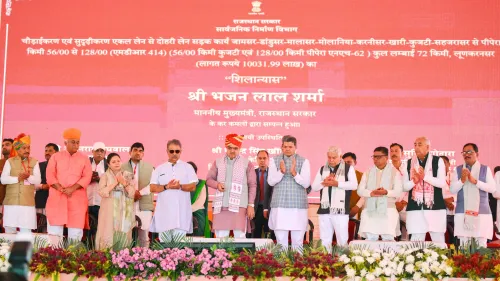Tourism and Hospitality Sector Set to Create 6.1 Million New Jobs in India by 2034: Study

New Delhi, Dec 18 (NationPress) The Tourism and hospitality sector is projected to generate 6.1 million new jobs in India by 2034, according to a report released on Wednesday.
The whitepaper, presented by the Confederation of Indian Industry (CII) and EY during the 18th Annual CII Tourism Summit, highlighted that despite challenges posed by the Covid-19 pandemic, the sector is experiencing a robust recovery, primarily driven by domestic tourism.
At present, this sector accounts for approximately 8 percent of India’s overall employment.
The report indicated that “by 2034, expenditures in this sector are expected to increase by 1.2 times, necessitating an additional 6.1 million workers. This will include 4.6 million males and 1.5 million females—underscoring the sector's crucial role in gender inclusion and workforce growth.”
To address this escalating demand, the CII-EY report emphasized the necessity for specialized expertise in digital marketing, sustainable tourism, and customer service.
It proposed the development of gamified learning management systems (LMS) for ongoing professional growth; partnerships with industry associations to formulate clear career progression routes; and the establishment of a dedicated task force under the Ministry of Tourism to standardize skills and education.
The whitepaper also “highlights the significance of incentivizing workforce participation, especially among women, while capitalizing on opportunities like medical tourism. It encourages the formation of a central tourism and hospitality authority to streamline governance, tackle fragmented infrastructure, and improve operational efficiency.
In line with global trends, the report advocates for the incorporation of Digital Public Infrastructure (DPI) to position India as a creative tourism hub. Suggestions include recognizing the sector's industry status, providing targeted subsidies, and implementing Employment Linked Incentive (ELI) schemes to boost job creation.
Importantly, the report introduced a Tourism Employment Index (TEI) to better analyze employment dynamics. It discusses leveraging the gig economy to offer flexibility and high-quality services during peak seasons, while identifying community-driven initiatives and Gen Z workforce preferences as crucial factors for fostering a more inclusive and innovative work environment.
“Looking ahead to 2036-37, the sector is anticipated to need an additional 6.13 million workers to support the growing tourism activities. Focused initiatives to upskill women and marginalized groups will be essential to close skill gaps and maximize the sector's potential for economic growth and job creation,” the report concluded.










